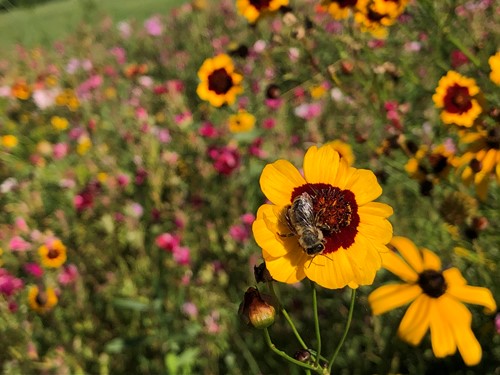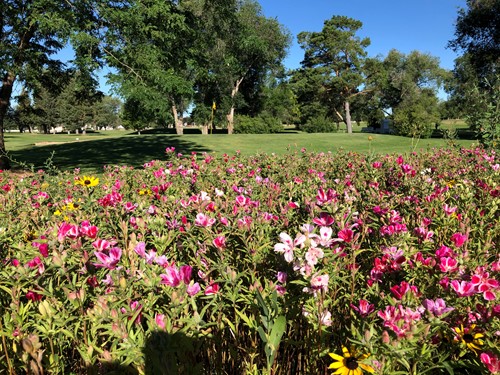City Pollinator Support Programs Meant to Bee


MOUNTAIN HOME, Idaho (Oct. 13, 2020) – Everyone knows plants need water, sunlight, and fertile soil to flourish, but there is an important element we often forget to include in the equation – pollinators. Pollinators like bees and the Monarch butterfly, Idaho’s official state insect, are integral to plant reproductive cycles, both in the wild and Idaho’s agricultural success.
"The City of Mountain Home recognizes the importance of these ecosystem drivers,” said Councilman Brad Stokes. “Our goal is to preserve and protect important insect species that occur naturally or are commercialized.”
In line with that goal, City staff have taken concrete steps toward implementing programs that help preserve and protect these important links in the ecological chain and the City Council has passed resolutions officially adopting pollinator protection policies.
Desert Canyon Golf Course Superintendent Jacob Olsen was the City’s trailblazer for local protection efforts. He began working through Operation Pollinator in 2016. Operation Pollinator, developed by the agricultural tech company Syngenta, provides golf course managers the tools and information to successfully establish and manage attractive wildflower resources that are crucial for bumblebees and pollinating insects, while enhancing the visual appearance of the course and the overall playing experience.
Olsen worked with Syngenta and Simplot to select plants and has established about 1000 square feet of wildflowers ideal for bee foraging at Desert Sage. Olsen took the project one step further and brought four honey bee colonies onto the course grounds, which are home to between 50,000 to 100,000 honey bees through the summer months. Randy Valley, a local beekeeper, has teamed up with Olsen to help address concerns and ensure the program stays on course
“The main reason I thought we needed bee hives on the golf course was because honey bees have been in rapid decline,” said Olsen. “I thought we could take a small part in helping with that. The golf course is well placed to establish and preserve habitats to help prevent further pollinator decline.”
According to a 2012 U.S. Department of Agriculture Report to the National Stakeholders Conference on Honey Bee Health, there were approximately 4 million honey bee colonies in the U.S. in 1970. By the time the report was published – at the height of the scientific community’s concern for the species – only about 2.5 million colonies remained.
The Environmental Protection Agency website notes that the first real indicators of the decline happened in the winter of 2006-2007 when beekeepers began to report unusually high losses of 30-90 percent of their hives. As many as half of them displayed symptoms not associated with any known causes of honey bee death. As the trend continued, it was eventually dubbed “Colony Collapse Disorder” (CCD) by scientists who studied the problem. Now the EPA says a variety of factors may contribute to CCD including crop pesticides, invasive mites, inadequate foraging opportunities, and stress placed on hives through certain management practices.
The USDA has since reported a slow but steady comeback, with the Jan. 1, 2020 official count at 2.98 million. Supporting the continuation of this comeback is important, not only for the bees themselves, but for humans, according to Stokes.
“Honey bees are responsible for one of every three bites of food humans consume, as they are responsible for the pollination of angiosperms (flowering plants) and their fruit,” he said.
Prior to Stokes’ election to the City Council, he was a University of Idaho Extension Cropping Systems Educator.
In 2018, the City Council passed two resolutions that officially recognized the problem and adopted programs and policies that actively support pollinators and deter practices that may lead to CCD among local pollinator populations.
The first, Resolution 08-18, designates Mountain Home as a Bee City USA affiliate. The resolution:
- Officially recognizes the importance of wild native and introduced bee species and the positive impact they have on the local economy and ecology
- Accepts responsibility for taking an active role in conservation of these species
- Establishes a dedicated pollinator-friendly garden inside city limits to increase foraging resources, and
- Designates collaboration among 4-H volunteers, the City Parks and Recreation Department, and Master Gardeners of Elmore County as the means for establishing and maintaining the pollinator garden
The second, Resolution 30-18, outlines and implements the City’s official Pollinator Protection Policy. The resolution:
- Recognizes the role of neonicotinoids, the most widely-used class of insecticides, play in impairing foraging patterns, altering reproductive cycles, and impairing immune systems – all of which can lead to hive collapse.
- Further recognizes that this class of pesticides can have adverse effects on birds, aquatic animals, and the ecosystems they support
- Bans the use of neonicotinoids on City-owned land or the purchase of any landscaping material or plant that has been treated with neonicotinoids
- Discourages the use of any herbicide or pesticide on City property, except where there is a ‘justifiable need” (legitimate existing nuisance and not as a preventative measure).
In 2019, the Council adopted a third pollinator-friendly resolution, this time aimed at protecting the Idaho state insect, the Monarch butterfly. The resolution:
- Designates Mountain Home as a Monarch City USA affiliate
- Cites a 99.4 percent decline in the California overwintering population of Monarchs, which has been scientifically documented over 30 years, as justification
- Officially recognizes the importance of Monarch butterflies to Idaho’s ecology and agricultural economy
- Pledges to plant native milkweed and nectar plant resources on City grounds to support Monarch habitat and foraging needs
- Encourages habitat creation on public and private land by government agencies, business owners, churches and private citizens.
Mountain Home recreation Superintendent Tiffany Belt said Parks and Recreation personnel are also working toward creating a pollinator garden near the water wheel feature in Legacy Park.
“The benefits from Bee City USA, Monarch City USA, and our Pollinator Protection Resolutions are numerous," said Stokes. “This reminds the public that the local government body is concerned and realizes the importance of pollinators in the ecosystem. We hope other cities will follow Mountain Home’s example and consider taking these important steps toward the protection of Idaho’s beautiful lands.”


